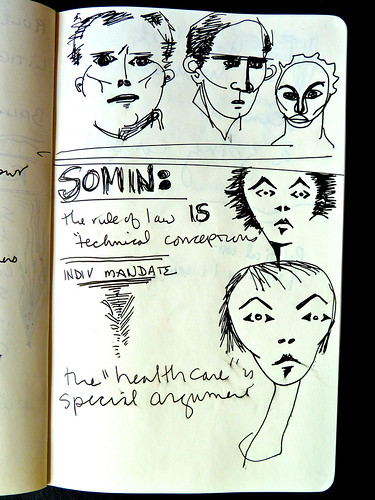By the way, last Wednesday, I attended a Federalist Society-sponsored panel discussion here in Madison about this topic. One of the speakers was Wisconsin Attorney General J.B. Van Hollen, who has just taken steps to join the Florida lawsuit challenging the law. Also on the panel were Jon Richards, a state legislator who supports the law, and Ilya Somin, the George Mason law professor who has written that the lawsuits are at least not frivolous.
Scrambling to find 2 of the last few seats, Meade and I sat at a table which seemed to be full of lawyers who supported health care reform. One lawyer haughtily informed me that whatever law professors might think about the Constitution, it's really all politics, and this health care reform represents a big, important political effort and that's why it's going to be upheld in the courts. I said, if it's all politics, then what of all the politics pushing back against the law? What about the polls that show most people are against it and what about the last election? If you're going to say politics determines the outcome, then don't you have to take that politics into account too? The lawyer looked either alarmed or angry, because I, a law professor, didn't simply assert that the Constitution matters, which would have made it easy for him to irritatingly chuckle about naivete. But right then, the panel started, saving him from having to try to wriggle off my skewer.
Van Hollen kicked off the discussion with assertions that he joined the lawsuit not because he's opposed to the health care statute, but because of the rule of law. The litigation is important to test the scope of congressional power. We have a system of a balance of powers, which he likened to a "teeter-totter." The states have to take their position on the other side of the teeter totter or things aren't going to work very well. The idea is to push back against federal power and to give the courts the opportunity to clarify the law. Van Hollen speaks like the well-polished politician he is.
Richards was having none of this abstract rule-of-law business. Economic realities should trump legal jargon, he said. He portrayed constitutional law as a matter of technical conceptions that shouldn't be allowed to stop government from doing the things that need to be done. He focused on the policy reasons for supporting the law and the argument that the law is constitutional flowed naturally from his support of the law. As for lawsuits: "Lawsuits are a real distraction."
Somin said the rule of law is "technical conceptions" — which was the punchline of the day, in my view. He gave a measured presentation, explaining the case law in a professorly style, and assessing the odds that the Supreme Court would overturn the individual mandate. (He said the 4 liberals would stick together and uphold it, that the conservatives were a more "fractious" bunch, so although Scalia, Thomas, and Alito would vote against it, he doesn't know what Roberts and Kennedy will do.)
Here's my page of notes from the Somin part of the panel:

After that, there were some questions from the audience. One questioner, trying to get his mind around the notion that the failure to buy insurance is inactivity and arguably therefore not "economic activity" within the meaning of the Commerce Clause case law, said "If you look at a human being as a going concern...." — which I thought was pretty funny. Yes, the government sees us as little businesses, as we sit here ostensibly doing nothing: our hearts pump blood, our gut digests food, and our brain cells spark with resistance to the purchase of products the government knows we should be buying.
ADDED: Video of the panel, via Ilya.
 :.
:.

0 comments:
Post a Comment